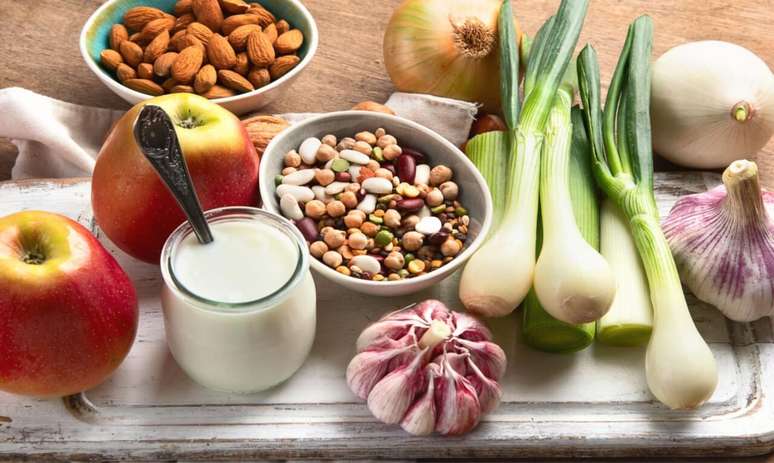Probiotic foods are particularly important for intestinal health and therefore should not be excluded from the diet.
Probiotic foods are those that contain live microorganisms in their composition and which, when administered in correct quantities, are beneficial to health. The intestine benefits the most, as the benefits are particularly important for its microbiota.
Because they have these health effects, probiotic foods are also functional foods, explains nutritionist Larissa Olmo. The professional draws attention to the difference between prebiotic, probiotic and synbiotic foods.
“Prebiotic foods are those that have in their composition compounds that are not digestible by the human body, but the bacteria present in the intestine can do so, that is, prebiotics and probiotics go together,” he says.
“Finally, symbiotic foods are those in which prebiotics and probiotics are combined, for example when you eat yogurt (probiotic) and grapes (prebiotic fruit) at the same time,” adds the expert.
Probiotic foods can contain different microorganisms in their composition with different effects. The best known microorganisms, according to Larissa, are those of Lactobacilli AND Bifidobacterium.
Functions in the body
Doctor specializing in natural medicine and integration, Christian Aguiar, explains the functions of probiotic foods in the body. Check:
- Modulation of the intestinal microbiota: Probiotics act as modulators, promoting the growth of beneficial bacteria and inhibiting pathogens. This process, called competitive exclusion, is fundamental for the balance of the intestinal ecosystem;
- Strengthen the intestinal barrier: In vitro and in vivo studies demonstrate that some probiotics stimulate the production of mucin and strengthen the intercellular junctions of the intestinal epithelium. It therefore reduces permeability and the risk of bacterial translocation;
- Immunomodulation: Probiotics interact with the intestinal mucosal immune system (GALT), stimulating the production of anti-inflammatory cytokines and modulating the adaptive immune response. This effect impacts not only gut health, but also systemic conditions such as allergies and autoimmune diseases;
- Production of beneficial metabolites: Many probiotic strains produce short-chain fatty acids (SCFAs) such as butyrate, propionate, and acetate. These compounds are a source of energy for colonocytes and have anti-inflammatory and antineoplastic properties;
- Vitamin synthesis: some probiotic bacteria can synthesize B vitamins and vitamin K, contributing to the nutritional status of the host;
- Digestion and absorption of nutrients: some probiotics produce enzymes that help in the digestion of complex carbohydrates and proteins, improving nutrient absorption and reducing the symptoms of food intolerances;
- Neuroimmunomodulation: Evidence suggests that probiotics may influence the gut-brain axis through neurotransmitter production and modulation of the inflammatory response, with potential implications for mental and neurological health.
“In conclusion, probiotic foods are promising in promoting health and preventing disease,” the doctor emphasizes.
Examples of probiotic foods
The doctor specialized in natural medicine and integration indicates some examples of probiotic foods and explains their health benefits. I wait:
- Natural Yogurt: A classic among probiotics, natural yogurt, fermented with Lactobacillus and Bifidobacterium, offers numerous benefits to intestinal health. Studies indicate that regular consumption of natural yogurt can reduce antibiotic-associated diarrhea, improve lactose digestion and strengthen the immune response;
- Kefir: Originating from the Caucasus Mountains, kefir is a milk-based drink fermented from kefir grains, a symbiotic community of bacteria and yeast. Kefir modulates the intestinal microbiota, inhibits pathogenic bacteria such as Salmonella and E. coli and has anti-inflammatory potential;
- Sauerkraut: A traditional German dish, sauerkraut is made with cabbage fermented by lactic acid bacteria such as Leuconostoc, Lactobacillus and Pediococcus. Rich in probiotics, sauerkraut can aid digestion, strengthen the immune system and improve cardiovascular health;
- Kombucha: A fermented drink made from black or green tea, kombucha has gained popularity for its potential health benefits. Fermentation occurs through a symbiotic culture of bacteria and yeasts (SCOBY), which produces probiotics, organic acids and antioxidants. Studies suggest that kombucha may have antimicrobial, antioxidant, and anti-inflammatory effects;
- Miso: An essential ingredient of Japanese cuisine, miso is a fermented paste of soybeans, salt and, usually, rice or barley. Rich in probiotics, digestive enzymes and antioxidants, miso improves digestion, reduces the risk of certain cancers and strengthens the immune system.
Treatment and contraindications
According to nutritionist Larissa Olmo, including these foods in your diet is essential and important. However, its consumption must be associated with habits and a healthy diet to enhance its effects on the body.
Additionally, these foods can bring some common side effects, such as gas and bloating due to the fermentation of these bacteria in our intestines. “Therefore, in some situations where some intestinal pathology is involved, the effect of these foods may not be so positive, to be evaluated”, warns the professional.
Source: Terra
Ben Stock is a lifestyle journalist and author at Gossipify. He writes about topics such as health, wellness, travel, food and home decor. He provides practical advice and inspiration to improve well-being, keeps readers up to date with latest lifestyle news and trends, known for his engaging writing style, in-depth analysis and unique perspectives.





-tocxfqlohicw.jpg)


